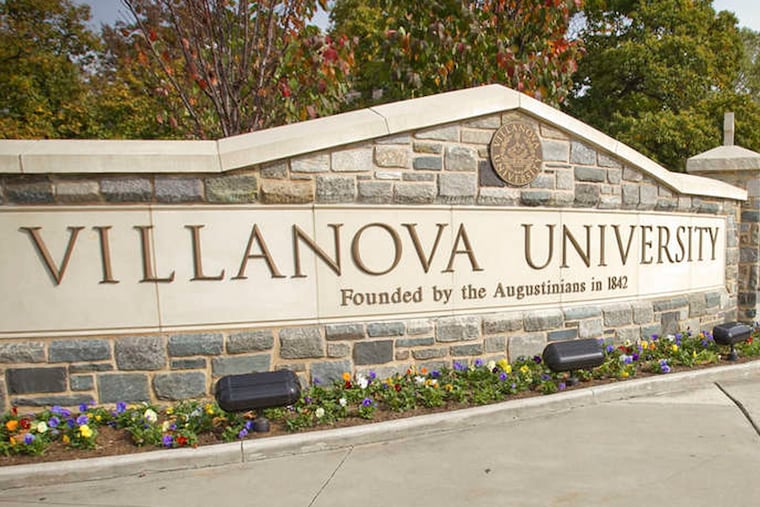Villanova U. to arm its police force
Villanova University announced Monday that it will add armed police officers starting next fall in response to rising nationwide concerns about campus safety.

Villanova University announced Monday that it will add armed police officers starting next fall in response to rising nationwide concerns about campus safety.
The Catholic university now has a 75-member public safety department, responsible for patrol, investigations, parking enforcement, residence hall and building security, and crime prevention, but the officers cannot arrest suspects or carry guns or batons.
However, under the new arrangement, 19 members of the department - about 20 percent - will become armed police officers who will have completed police academy training, the university said.
The decision comes as college campuses across the country face increasing security threats. Villanova spokesman Jonathan Gust said there had been about 100 college campus shootings since the 2007 massacre at Virginia Tech that left 32 dead and 17 wounded.
"It's better to be safe than sorry," said Camila Arteaga, 18, a freshman biology major from Puerto Rico.
Of seven students interviewed on campus, only one said she was on the fence about the idea, and she questioned how much the police would be needed day to day.
Villanova officials acknowledged the university's 260-acre Radnor campus is in a relatively safe community on the Main Line.
"But we know that safe areas aren't immune to acts of violence," said Chris Kovolski, assistant vice president of government relations and external affairs. "This is more about being prepared for what could happen."
Many local colleges, including the University of Pennsylvania, Drexel, Temple, West Chester, Lincoln, Rutgers-Camden, Rowan, and Pennsylvania State University, already have armed police forces.
Nationally, three quarters of four-year college campuses with 2,500 or more students had armed officers in 2011-12, according to a report from the U.S. Bureau of Justice Statistics.
But other suburban campuses, including Haverford, Swarthmore, Cabrini, Rosemont, Neumann, Immaculata, and Bryn Mawr, and even some city universities, such as St. Joseph's University, do not have armed officers.
Villanova officials said the location of their more than 10,000-student campus presented special challenges.
"With three train stations on campus, close proximity to a major highway, and hundreds of thousands of visitors each year, the combination of police and campus security officers will be able to provide a higher level of campus safety," said Ken Valosky, executive vice president, who oversees public safety.
Universities across the region were put on heightened alert this month when federal law enforcement agencies said an anonymous threat of violence had been made against an unnamed local campus for a specific date and time.
That threat, which proved unfounded, came a day after eight students and their professor were killed in a classroom at Umpqua Community College in Roseburg, Ore.
"Many in our community expressed to me how shaken they were two weeks ago with the threat to Philadelphia-area colleges and universities," the Rev. Peter Donohue, president of Villanova, said in an email Monday, announcing the change to staff and students. "My greatest fear is the loss of a member of our community, particularly as a result of violence on our campus."
Villanova officials said the changes would improve safety on campus. Now, the university's security officers can't use lights or sirens when responding to emergencies. They can't stop, question, or detain anyone without the individual's permission.
They do not have direct radio communication with local police departments, which can hinder emergency communications. And they lack access to local law enforcement databases, which could help in an investigation.
"Right now, security officers don't have any more rights than private citizens do," said David Tedjeske, director of public safety. "We can find ourselves literally sitting on Lancaster Avenue in traffic in an emergency."
Radnor Township police come onto campus about 250 times a year to assist with arrests and security for big events, Tedjeske said. Villanova will still rely on township police, but its own officers will be able to handle some of the load.
In 2014, Villanova received three reports of rape, two robberies, three aggravated assaults, 25 other assaults, 114 thefts, two arsons, 35 incidents of vandalism, 28 incidents involving narcotics, and 51 cases of disorderly conduct.
Villanova's decision to move to armed officers follows a two-year study by a university task force and help from a consultant.
In addition to academy training, officers will get specialized training in conflict resolution, antibias, and sensitivity issues. Villanova also will set up an "oversight committee" to make sure policies and procedures are followed.
215-854-4693 @ssnyderinq